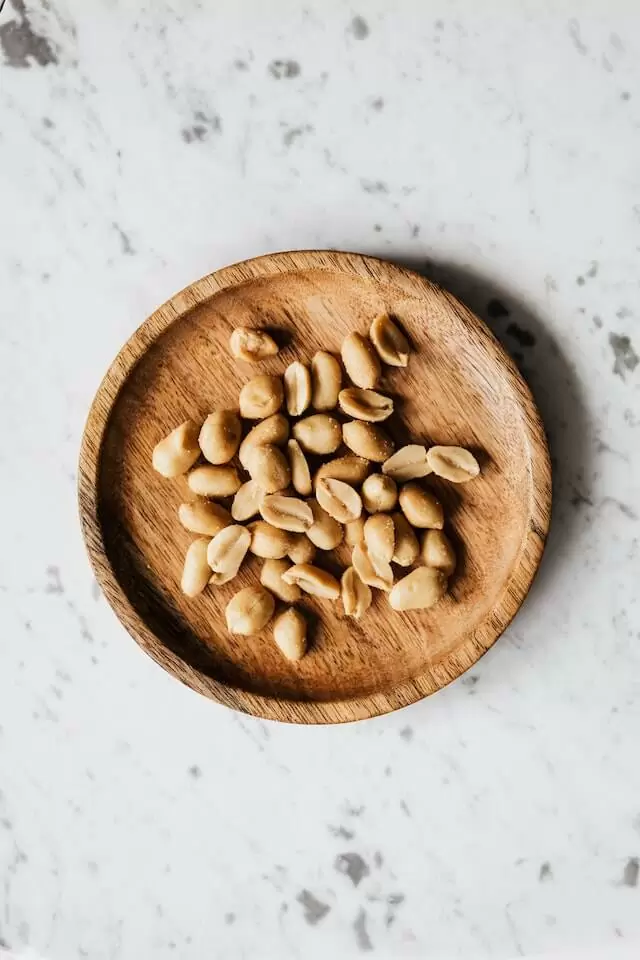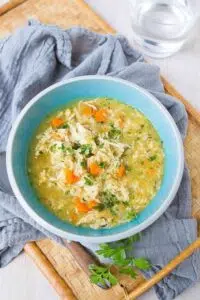If you’re deliberating on how to eat peanuts for weight loss, you are in the right place.
In this blog post, I’ll discuss in detail “are peanuts good for weight loss” and “what is the best time to eat peanuts for weight loss.”
Peanuts are one of the most popular foods in the American diet. They are commonly utilized as a dessert topping or a healthy snack.
They are available in various varieties, such as salted, raw, boiled, roasted, plain, and flavored.
They are notorious for their fat and high protein content. Besides, they are also high in calories. Peanuts are affordable, convenient, and delicious.
Table of Contents
ToggleWeight Loss And Maintenance
In my journey of weight loss, I found that peanuts and peanut butter played a crucial role. Incorporating them into my diet significantly improved my compliance with weight loss plans.
Studies suggest that people are three times more likely to stick with a diet that includes these “good” fats, compared to a low-fat alternative. This was true for me, especially when I adopted a Mediterranean-style diet.
Peanuts naturally reduce the desire to eat, providing dietary compensation by making you feel fuller with fewer calories. My experience aligns with research showing that people naturally compensate for the calories from peanuts by eating less throughout the day.
Moreover, regular peanut consumption over weeks led to an increase in resting energy expenditure, which means more calories excreted and not absorbed by the body. This unique complete package offered by peanuts contributes to weight management and satiety.
For me, losing weight didn’t mean giving up the foods I love. A small daily serving of peanuts or peanut butter made a huge impact on the success of my diet. Peanuts, indeed, are more than just a snack; they are a powerful component in maintaining health and a healthy diet.
- Results from a 2017 weight loss intervention revealed that participants who included nuts in their diet weighed significantly less at the end of the intervention.
- Research involving 9,000 people in Spain showed that those who consumed peanuts at least two times a week were 30% less likely to gain weight compared to those who rarely ate them.
- The benefits of peanuts in weight management were also evident in children; a childhood weight loss study in schools demonstrated that replacing unhealthy snacks with peanuts every day led to significant results.
- Two-year data published in the journal Obesity indicated that two-thirds of children in the treatment group who were fed peanuts either lost or kept their weight off.
Integrating peanuts into my diet wasn’t just about following a trend; it was about making a sustainable and enjoyable change towards a healthier lifestyle.
Peanuts: A Source Of Energy
Peanuts play a significant role in weight loss by providing sustained energy while managing calorie intake.
Unlike many other high-calorie foods, a portion of the calories from peanuts and peanut products is not fully absorbed by the body, making them a surprisingly effective choice for those looking to lose weight without feeling energy-deprived.
This unique characteristic of peanuts is backed by scientific findings. Studies have shown that regular consumption of peanuts can lead to an increase in resting energy expenditure (REE).
This means that even when at rest, the body burns more calories after consuming peanuts, aiding in weight management. This is especially beneficial for overweight individuals who supplemented their diets with peanut oil.
The increased metabolism and improved digestion associated with peanut consumption are key factors in how they assist with weight maintenance.
Furthermore, the health benefits of peanuts extend beyond just weight loss. They are a complete package, offering a unique blend of nutrients that contribute to overall health and diet.
Their ability to provide satiety and assist in weight management makes them a valuable addition to a balanced diet. As a unique and natural food choice, peanuts not only fuel the body but also support long-term health and wellness goals.

Are Peanuts Good For Your Diet?
Integrating peanuts into your diet can be a strategic move for those aiming to lose or manage weight. Not just a tasty snack, peanuts, including peanut butter and peanut oil, are rich in high monounsaturated fats, making them a valuable part of various weight loss diets.
Unlike low-fat diets, which have been the traditional go-to for weight loss, peanuts offer more favorable effects on cholesterol levels.
The benefits of peanuts in diets have been supported by substantial evidence. Studies indicate that diets higher in unsaturated fats – including those fats found in peanuts – not only aid in weight loss but also reduce heart disease risk.
A controlled clinical trial comparing a low-fat diet to an unsaturated-fat diet with peanuts showed that both diets resulted in weight loss, but the unsaturated-fat diet was more effective in maintaining heart health.
In terms of cholesterol management, diets incorporating peanuts have shown promising results.
Researchers have found that these diets can lower total cholesterol and low-density lipoprotein (LDL cholesterol), while also maintaining or even increasing high-density lipoprotein (HDL cholesterol).
This balance is crucial for heart health, as it helps in decreasing triglycerides and improving the ratios of total to non-HDL cholesterol.
A study by Penn State University demonstrated the importance of diet composition during weight loss and maintenance.
It was observed that a moderate-fat diet including peanuts led to more stable triglyceride levels compared to a traditional low-fat diet. This suggests that the type of fat in your diet is as important as the amount.
Harvard researchers have also highlighted the long-term benefits of a Mediterranean-style, moderate-fat diet.
This diet, which includes healthy fats like those found in peanuts, helps individuals not only lose weight but also maintain that weight loss over time.
The study found that participants on this diet were more successful in keeping the weight off compared to those on a standard low-fat diet.
In conclusion, peanuts can be a nutritious and satisfying addition to a healthy diet. They provide healthful fats that not only aid in weight loss but also contribute to overall health and wellness.
Whether included in a Mediterranean-style diet or as a part of a controlled fat intake, peanuts can help you maintain your weight and improve your health in the long run.
Types Of Peanuts
Exploring the world of peanuts reveals a variety of types, each with unique characteristics:
- Virginia Peanuts: Known for their large size, Virginia peanuts are often shelled and salted. They’re typically consumed in their natural form or roasted, offering a classic, versatile flavor.
- Runner Peanuts: Predominantly grown in the US, Runner peanuts are the go-to choice for making creamy peanut butter.
- Valencia Peanuts: These are sweet in taste and are commonly loved in their boiled form. Valencia peanuts are also ideal for making natural peanut butter.
- Spanish Peanuts: Characterized by a higher oil content, Spanish peanuts are often used in salted nuts and candy bars, making them a flavorful snack option.
Which Ones To Choose?
When incorporating peanuts into a weight loss diet, the type you choose is key. Opting for unflavored and minimally processed peanuts is ideal. These varieties lack added salt and other ingredients that can detract from their nutritional value.
It’s wise to avoid candied peanuts, which are coated in sugar and contribute additional calories without substantial nutritional benefits.
Including peanuts with their skins can offer extra fiber and antioxidants, enhancing the feeling of fullness and aiding in weight management.
Boiled peanuts are a great choice as they contain fewer calories and less fat compared to their raw or roasted counterparts, yet still provide a satisfying filling effect.
Regardless of the type, being mindful of portion sizes is crucial to ensure that you gain the benefits of peanuts without overindulging.
Summary
For effective weight loss, opt for raw, roasted, or boiled peanuts as a healthy snack. Ensure they are free of added salt and flavoring, and always be mindful of portion sizes.
Are Peanuts Good For Weight Loss?
Yes, peanuts can aid you in losing weight in several ways. Many studies have demonstrated that consuming peanuts is linked with a healthy weight.
Also, they are associated with lower rates of obesity. Here’s how soaked peanuts for weight loss affect your weight:
-
Packed With Healthy Fats
Peanuts are chiefly rich in two healthy fats: polyunsaturated fatty acids and monounsaturated fatty acids.
You can lower the hazard of gaining weight by eating peanuts.
According to NCBI’s study, they can improve the human body’s ability to transform stored fats into energy, assisting in weight loss acutely.
-
Keep You Full For A Long Time
Peanuts are high in proteins, fats, and fiber, which take a long time to digest.
According to a study, adding either peanut butter or whole peanuts to breakfast leads to more stable blood sugar levels and increased fullness.
Simple carbs are swiftly absorbed into the blood and lead to a rapid spike in blood sugar followed by a quick drop.
This may cause you to feel hungry soon after eating food.
On the other hand, peanuts are digested slowly and stay in the stomach longer. This helps you feel satisfied and fuller for longer.
-
Aids In Lower Caloric Consumption
Peanuts are loaded with calories, but with a controlled intake in sensible servings, they help you feel full for longer.
So, if you eat peanuts as a snack, it may decrease your next meal intake.
So, how much peanut can I eat a day for weight loss? You can eat 1-2 handfuls per serving of peanuts since they are easier to overeat.
-
Reduces Your Food Cravings
Peanuts can be an answer to managing food cravings, a common hurdle in maintaining a balanced diet for weight loss. Their low Glycemic Index helps to stabilise blood sugar levels, gradually releasing sugar into the bloodstream.
This controlled release keeps you feeling more energetic and less prone to craving food, leading to more positive results in your weight loss journey.
How To Eat Peanuts For Weight Loss?
A good thing about peanuts is that you can eat them in various forms.
Some people eat raw peanuts, while others eat boiled or roasted peanuts. You also consume peanut oil or peanut butter.
Nevertheless, if your objective is to lose weight, you can consume peanuts at night for weight loss.
-
As A Mid-Day Snack
Peanuts are a power snack that can be consumed when roasted.
You may be thinking, “are dry roasted peanuts good for weight loss”? They are a filling snack, and eating a handful of them can make you feel full until dinner without eating any other meal.
If you don’t have time to roast them, you can eat them raw.
-
Add Them To Protein-Rich Foods
Another way of how to eat peanuts for weight loss is to add them to protein-rich foods.
You can add them to foods like grilled chicken or salads to enhance the dish’s ability to keep you fuller for a long time.
This will aid you in controlling your hunger, especially when you intend to lose weight.
Moreover, peanut dishes are tempting due to their deliciousness.
-
Peanut Butter
Peanuts are excellent for weight loss, but you must eat them in moderation.
If you want to eat peanut butter for weight loss, you should only eat two tablespoons twice or thrice a week.
Exceeding this will manifest in surplus caloric intake, delaying your weight loss.
For a personalized approach to managing your calorie intake, consider using a calculatorweightloss to determine your ideal calorie goals.

Frequently Asked Questions About Are Peanuts Good For Weight Loss
1. Does Roasted Peanuts Increase Weight?
Although they are rich in calories and fats, they don’t contribute to weight gain.
In fact, they help in maintaining a healthy weight and diminishing the threat of obesity.
2. Is Salted Peanuts Good For Weight Loss?
According to researchers, eating lightly salted peanuts twice a day before meals can help lose weight and lower blood pressure.
3. Can We Eat Peanuts At Night For Weight Loss?
At night, there is not much physical activity, so the high calories of peanuts are not utilized for energy. They end up being stored as fat.
So, it is recommended not to consume peanuts or other nuts before sleeping if you aim to lose weight. You can eat them before exercise or in the morning.
4. Do Peanuts Help Burn Belly Fat?
Peanuts are loaded with healthy fats, protein, and fiber, so they help lose weight and burn belly fat.
5. What Is The Right Time To Eat Peanuts?
You can have them as an evening snack. You can also add them to chaat or protein bars.
The best time to eat peanuts for weight loss is morning or daytime. A late afternoon snack of peanuts is also ideal.
6. How Many Peanuts Can You Eat A Day?
You can only eat 42 grams of peanuts every day. This is about 16 peanuts.
Consuming them in moderation is essential because they contain calories and fat.
7. Do Peanuts Make You Fat?
Contrary to common belief, peanuts, despite being high in fat and calories, do not necessarily lead to weight gain. Their protein content promotes a sense of fullness, helping to control hunger. Consuming them in a moderate amount can be part of a balanced diet without contributing to weight gain.
8. Is Groundnut Good For Weight Loss?
Groundnuts, commonly known as peanuts, are excellent for weight loss due to their rich nutrition profile. As a healthy snack, they provide essential fiber, protein, and healthy fats, aiding in effective weight management. However, it’s important to be mindful of the serving size to fully reap these benefits.
9. What Are The Benefits Of Eating Peanuts At Night?
Eating peanuts before bed can boost metabolism and increase body heat, providing a gentle warming effect. Peanuts, like other nuts, contain melatonin, which helps regulate the sleep cycle, ensuring a good night’s shut eye.
10. Are Boiled Peanuts Good For Weight Loss?
Boiled peanuts are beneficial for weight loss, offering fiber, protein, and healthy fats, aiding in weight control while being mindful of portion sizes.
11. How To Remove Fat From Peanuts?
To remove fat from peanuts, start by grounding them or using peanut butter. Place this in a pot with an equal amount of water, stir well, and boil. Use a fat separator to separate the oil from the peanuts. Then, transfer the peanut water mix into a heat-resistant form and dry it in an oven at a low temperature.
12. Is Fried Groundnut Good For Weight Loss?
Fried groundnuts, while rich in nutrients, are not the best option for weight loss due to the additional calories and fats from frying. They can counteract weight loss efforts by increasing calorie intake. Opting for raw, boiled, or dry-roasted groundnuts is more effective for managing weight.
Conclusion
So, how to eat peanuts for weight loss? You can eat them by adding them to protein-rich foods and as a mid-day snack.
They are good for weight loss and burn belly fat. They boost your metabolism rate by acting as an energy source. They digest slowly and keep you fuller for a long duration.
You May Also Like These Posts
- Banana Pudding With Cream Cheese
- Dark Chocolate Almond Bark
- Oven Roasted Italian Sugared Almonds
- Chocolate Covered Strawberries With Nutella
- Easy Christmas Pudding
- How To Keep Food Hot For Hours? 16 Effective Ways
- How To Fix Rubbery Banana Bread? 8 Easy Fixes
- How To Tell When Banana Bread Is Done? 5 Reliable Ways
- How Long Do Homemade Chocolate Chip Cookies Last
- How To Heat Up Food Without Microwave? 20 Effective Ways
- The Perfect Pairings: What to Serve with Banana Bread
- 22 Effective Ways How To Cook Food Without Fire And Electricity
- How Much Is 3/4 Teaspoon Of Baking Soda
- Almond Bark vs White Chocolate: What’s the Difference
- What Is The Difference Between Red Velvet And Chocolate Cake











